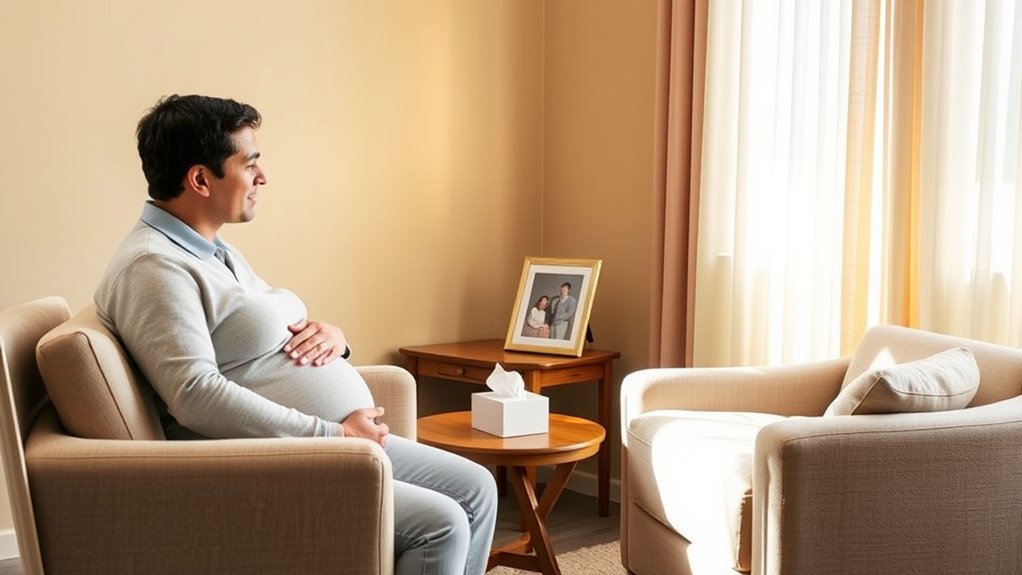After welcoming a baby, your relationship may face new stresses like frequent arguments, feelings of disconnection, or reduced intimacy. If you notice frustration, irritability, or withdraw from your partner, it might be time to contemplate couples therapy. It can help you both communicate better, rebuild trust, and strengthen your bond despite postpartum challenges. Exploring these options now can make a meaningful difference—continue to learn more about how therapy can support your family during this time.
Key Takeaways
- Frequent arguments, feelings of disconnection, or reduced intimacy may indicate the need for couples therapy after a baby.
- Postpartum stressors like exhaustion and routine changes can strain the relationship, signaling it’s time to seek support.
- Therapy helps address communication challenges, rebuild trust, and strengthen emotional intimacy during the postpartum period.
- Recognizing signs like increased irritability, resentment, or loneliness suggests couples could benefit from professional guidance.
- Initiating therapy early can improve coping strategies, boost confidence, and foster a healthier partnership amid postpartum challenges.
Recognizing Signs That Your Relationship Needs Support

Many new parents find themselves overwhelmed and exhausted, but recognizing when these feelings signal deeper relationship issues is essential. If you notice frequent arguments, even over small things, it might be a sign your relationship needs support. Feeling disconnected from your partner or less interested in intimacy can also indicate underlying problems. Increased irritability, ongoing resentment, or feeling misunderstood are warning signs as well. You might find yourself avoiding your partner or feeling more lonely despite being physically close. These feelings don’t have to be permanent, but they signal that your relationship could benefit from outside help. Paying attention to these signs early can prevent issues from escalating and help you rebuild connection and understanding during this challenging time. Recognizing relationship stressors early on can make a significant difference in addressing underlying issues before they become more serious.
Common Challenges Couples Face After Welcoming a Baby

Welcoming a new baby often brings joy, but it also introduces a range of challenges that can strain your relationship. Sleep deprivation becomes common, leaving you both exhausted and irritable. Balancing responsibilities feels overwhelming, and you might feel disconnected from each other amid the chaos. Communication can suffer as you’re juggling feedings, diaper changes, and household tasks, leaving little time for meaningful conversations. Emotional stress may also surface, with feelings of frustration, anxiety, or sadness. You might notice your intimacy declining or feel unsure about how to support each other. These challenges are normal, but without intentional effort and understanding, they can create distance. Recognizing these struggles is the first step toward working through them together.
Benefits of Therapy During the Postpartum Period

Therapy during the postpartum period offers a supportive space to navigate the intense emotions and practical challenges that come with new parenthood. It helps you process feelings of exhaustion, frustration, or overwhelm, reducing stress and preventing burnout. By talking openly with a therapist, you can gain clarity about your needs and develop coping strategies tailored to your situation. Therapy also provides a safe environment to address any relationship strains that may arise, fostering understanding and resilience. Additionally, it can boost your confidence as parents by helping you set realistic expectations and celebrate small victories. Engaging in therapy during this time isn’t just about managing difficulties—it’s about nurturing your mental health and strengthening your ability to adapt to this new chapter confidently. Incorporating mindfulness and emotional regulation techniques can further support your mental well-being during this transformative period.
How Couples Therapy Can Improve Communication and Intimacy

Couples therapy can be a powerful tool for improving communication and intimacy after having a baby, especially when new parenthood brings unexpected challenges. It provides a safe space where you can openly share your feelings and concerns without judgment. Through guided conversations, you’ll learn to listen more actively and express yourself clearly. Therapy helps identify patterns of miscommunication and teaches strategies to resolve conflicts constructively. As you work through these issues, you’ll rebuild trust and deepen your emotional connection. Improving communication fosters a greater sense of understanding and support, which is essential during this demanding period. Over time, this strengthened bond can reignite intimacy, helping you and your partner feel closer and more connected despite the stresses of new parenthood. Incorporating elements of creating a calming environment, such as soft lighting and comforting textiles, can also support this emotional healing process.
Choosing the Right Therapist for Your Family’s Needs

Finding the right therapist for your family’s needs can feel overwhelming, but taking the time to choose carefully guarantees you get the support that truly fits your situation. Start by considering the therapist’s expertise in family and couples therapy, especially with post-baby dynamics. Look for someone who creates a warm, nonjudgmental environment where everyone feels safe sharing. Check their credentials, experience, and approach—whether they focus on communication, parenting, or emotional healing. Trust your instincts during initial consultations; you should feel comfortable and understood. Don’t hesitate to ask questions about their methods and how they tailor sessions to your unique family. Remember, the goal is to find a professional who can guide you through challenges and help rebuild connection in this new chapter of your family life. Additionally, understanding the importance of family dynamics and how they influence therapy outcomes can help you select a practitioner suited to your needs.
Practical Steps to Initiate Couples Therapy

Starting the process of couples therapy can feel intimidating, but taking clear, practical steps makes it more manageable. First, discuss your feelings with your partner and agree that therapy could help. Then, research therapists in your area who specialize in post-baby transitions and check their credentials. Reach out via phone or email to ask about their approach and availability. Set a tentative appointment and prepare to share your concerns openly. Consider logistical details like scheduling sessions around your routines and childcare. Be honest with yourself and your partner about what you hope to achieve. Taking these initial steps builds a foundation of commitment and clarity, making the journey toward strengthening your relationship more straightforward. Understanding cookie consent options can help ensure a smooth experience when accessing online therapy resources.
Maintaining a Strong Connection Beyond the Transition

Even after steering the immediate challenges of new parenthood, maintaining a strong connection requires ongoing effort and intentionality. You need to prioritize quality time, open communication, and shared experiences. Make space for regular check-ins, express appreciation, and stay attentive to each other’s needs. Small gestures, like a date night or simple words of affirmation, reinforce your bond. Use the following ideas to stay connected:
| Action | Example | Benefit |
|---|---|---|
| Schedule dates | Weekly dinner or walk | Reconnect and relax |
| Share feelings | Talk openly about concerns or joys | Build trust and intimacy |
| Show appreciation | Compliment or thank each other | Strengthen emotional bond |
| Create rituals | Morning coffee or bedtime routine | Foster stability and closeness |
Additionally, maintaining a routine that incorporates these practices can help sustain your connection over time.
Frequently Asked Questions
How Long Should Couples Wait Before Seeking Therapy After Childbirth?
You might wonder how soon to seek therapy after childbirth. There’s no fixed timeline; it depends on your feelings and challenges. If you’re experiencing persistent stress, communication issues, or emotional struggles, don’t wait too long. Addressing concerns early can help both of you adjust better. Remember, seeking support at any point is okay. Trust your instincts and prioritize your mental health and your relationship’s well-being.
Can Therapy Help With Postpartum Depression and Its Impact on Relationships?
Sometimes, the shadows of postpartum feelings can cast a long, silent veil over your relationship. Therapy can be a guiding light, helping you navigate these emotional currents. It offers a safe space to explore your feelings, strengthen your bond, and develop coping strategies. By addressing postpartum depression with professional support, you not only heal yourself but also nurture the connection with your partner, fostering understanding and resilience during this challenging time.
Are Online or Virtual Therapy Options Effective for New Parents?
Online therapy can be highly effective for new parents, offering convenience and accessibility when time is limited. You can connect with licensed therapists from the comfort of your home, making it easier to fit sessions into your busy schedule. Many online platforms provide personalized support for postpartum challenges, relationship stress, and mental health. Just guarantee you choose a reputable provider to get the best care tailored to your needs.
How Do We Address Differing Parental Approaches in Couples Therapy?
You can address differing parental approaches in couples therapy by openly sharing your perspectives and listening to your partner’s. The therapist helps you both understand each other’s values and concerns, fostering empathy. Focus on common goals for your child’s well-being. Through guided discussions, you’ll learn to compromise and develop shared strategies, strengthening your partnership and ensuring you both feel heard and supported in your parenting journey.
What Are Signs Therapy Might Not Be Suitable for Our Relationship?
Did you know that about 30% of couples find therapy less effective if one partner is unwilling to participate? If you notice persistent communication breakdowns, ongoing resentment, or if either of you feels misunderstood despite trying, therapy might not be the best fit right now. It’s essential that both partners are open and committed to change; otherwise, progress could be limited. Recognizing these signs helps you decide when to seek alternative support.
Conclusion
Steering life after a baby brings joy and chaos, testing your bond in unexpected ways. While challenges may seem overwhelming, seeking therapy can restore connection and understanding. It’s a reminder that strength lies not in avoiding difficulties but in facing them together. Just as a fragile new life needs nurturing, so does your relationship—balancing vulnerability with resilience, chaos with intimacy. Embrace support, and watch your partnership grow stronger amidst the beautiful chaos.









